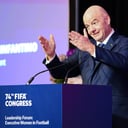Four members of Argentina’s women’s national team have withdrawn from international duty days before a pair of friendlies in Buenos Aires, citing a lack of pay and insufficient conditions at training camp.
Midfielder Lorena Benítez, goalkeeper Laurina “Lauchi” Oliveros, and defenders Julieta Cruz and Eliana Stábile shared on social media their decisions to leave the team in protest during this week’s FIFA window, calling for change and proper investment in the women’s game.
Advertisement
Argentina’s football association, AFA, has not publicly commented about the players’ statements and did not respond to requests for comment from The Athletic this week.
On Wednesday, the association’s president, Claudio “Chiqui” Tapia was seen at the team’s training session, which was partially open to press, and a new lineup has since been announced, replacing the four players with a collection of teenagers. Head coach Germán Portanova and players Vanina Correa and Aldana Cometti also appeared late Tuesday on the association-backed AFA Estudio YouTube channel, where they addressed the public spat and said they believed these matters should be addressed internally.
The absent quartet, who all play for Boca Juniors, were part of a 23-player roster called for back-to-back matches against Costa Rica in Buenos Aires this weekend. They seemed to have begun training with the team before abruptly leaving and sharing posts on Instagram alongside black-and-white images of them competing for La Albiceleste.

GO DEEPER
What the first Women's World Cup means for soccer in the region
What the players said
Benítez, 25, was the first to post, sharing the most detailed account of what she said transpired behind the scenes during camp. In Spanish, she said the “personal decision” to leave the team was motivated by “very sad” circumstances.
Benítez said the team was not given breakfast or lunch during training on two separate days last week and was told “there is no money” for food. She said players were given a ham and cheese sandwich and banana at the end of training on those days, even as players would not get home to a proper meal until around 3 or 4 p.m. – even later for players using public transportation to get home.
The team was also not given their usual stipend because the games were being played locally in Buenos Aires, which was done intentionally to limit expenses for the team, Benítez said. Again, players were told “there is no money.” Players were also told their families would be charged 5,000 pesos (or $5) for tickets to their games.
Advertisement
“Do I leave my children, my family, my club (Boca Juniors), my job, to go to a place (AFA) where they don’t value us as athletes, where they can’t give us the basics?” Benítez wrote. “We have been carrying a lot of things throughout all these years of representing our country, many colleagues have left for the same reasons, for feeling sadness and not joy every time it is time to be there.”
Benítez also said, “It is horrible and painful to think that my daughter chooses to play soccer and in 10 years she will have to be there and she will have to go through all this knowing the sacrifice she makes every day.”
Cruz, 27, went on to describe these conditions as humiliating in her post.
“There comes a point when injustices get tiring, when it’s tiring not to be valued, not to be listened to and even worse to be humiliated,” Cruz wrote in part. “Improvements are needed in the Argentine women’s soccer team and I’m not just talking about economics… I just wish that future generations don’t go through this and can really enjoy being on the national team.”

Oliveros, 30, shared a more pointed remark, emphasizing that change is needed for future generations of players: “My wish for this year and those to follow? That the next generations can enjoy and be happy running behind the ball, as perhaps at some point we were.”
Stábile’s comments were shared via an Instagram story that is no longer available. “I’ve been tired now for some time over the lack of interest in women’s football,” she wrote, explaining her decision to step aside from the team for this FIFA window. “We just want to be valued, and hopefully the next generation won’t have the same happen to them.”
While AFA has not addressed the public spat, the hour-long interview with Portanova, Correa and Cometti on AFA Estudio did address some of the protesting players’ claims. Correa and Cometti, for example, said players usually received a stipend for matches outside of Argentina, and players do receive a limited number of tickets to games for their families.
Before the situation became public, Correa and Cometti shared brief anecdotes of players meeting with AFA leaders to resolve some of the issues raised, although they did not specify what those solutions were.
“We solved several problems we had. There are many others that must continue to be resolved,” Cometti said, without elaborating further. “The struggle is ongoing, and it is not going to be solved with a per diem or with a match in Argentina. There are many other things that all of us as players and AFA, as an institution, must improve. In the end, we cannot expect to have everything from one day to the next. So, I believe that with the dialogue between players, those in charge, captains – with them we are going to achieve those things.”
Advertisement
Correa said players waited to hear from AFA before the team decided on how to proceed. That’s when some players chose to leave, while others chose to stay. Correa said her decision to stay was motivated by the reality that these next two games will be her last with the national team, and she wanted to retire on a pitch.
“My decision was to stay for myself and my family, my children, my partner, to be on the field, to retire on the pitch, because the decision could also have been (to retire) after the Gold Cup and not come back,” Correa said. “But it was my decision to come, to retire on a pitch and that was what I wanted. That does not mean I do not agree with my teammates in their claims. Every claim is valid, both for those who decide to fight from their place and those who decide to fight from within.”
Portanova said the public spat was a “sad situation,” but that he respected his players’ decisions to leave camp. He said players messaged him on Sunday before they made any public statements.
“I told them I respected the decision. I also understand the decision,” he said. “But we believe there is another way. We believe through dialogue, or internally, we can continue to grow women’s football. I think there has been progress in recent years, and I also think there is still a lot left to do, but through dialogue.”

GO DEEPER
What FIFA's new women's match calendar means for players
The reaction
The players’ public comments have raised alarms around Argentinian football from retired national team players on both the men’s and women’s sides, as well as outcry from others around international football.
Estefanía Banini, who retired from Argentina’s national team at the conclusion of last year’s Women’s World Cup, thanked the players on social media. She called it “a matter of time.”
Banini, who captained Argentina at the 2019 World Cup, has long been outspoken about the poor conditions she said the women’s national team has faced, and has been left off rosters despite being one of Argentina’s best players.
Advertisement
Speaking with TyC Sports last month, Banini, who is a forward with Atlético Madrid, talked about having to leave the national team for “non-football reasons.” She said it’s a reality that many players face, and leaving the team “wasn’t any easy decision.
“The truth is there are many players who are not on the national team for other reasons, not because of football,” Banini said. “I think we were exhausted by the lack of interest in the female branch. So, I think that taking a step aside and having new generations fight and try to improve that branch, we believed was the best decision.”
Banini said she missed “absolutely everything” about being with the national team.
“There is nothing that can compare to wearing the sky blue and white shirt,” she said. “Nothing.”

Juan Sebastián Verón, a former national team player and president of Club Estudiantes de La Plata, shared snippets of Banini’s comments from last month, calling the problems resurfacing in Argentina a “gender issue.”
He wrote: “Soccer needs to grow from its bases…with a vision and above all sustainability. Having a contract does not make you professional if everything else does not. If there is no support behind it to push growth there will be no future, in the end it is a gender issue, not a sport one.”
The issue brings to light the conditions faced by South American women’s players with the region’s first women’s World Cup coming to Brazil in 2027.
In Argentina, women’s football’s complicated past stands in stark contrast to the investment and popularity of the men’s game. The men’s side is the reigning Copa America and World Cup champions, with Lionel Messi at the helm. The federation has made significant investment in growing its reach into the United States, opening a new U.S. headquarters in Miami and even partnering with a local university for a 10-week sports leadership program to coincide with Copa America this summer.
For now, it seems like AFA is operating business as usual, with images of players inside camp posted to social media as recently as Wednesday night. It remains to be seen how players will respond when they return to the pitch this weekend.
